Throughout the year, we host a variety of events that spotlight the wide world of classical antiquity and its reception in the modern world.
Monday, October 6, 2025, at 4:30pm
Rittenberg Lounge, Mather Hall
The Wills of Gods and Men: Narrative Myth and Social Agency in Homer’s Odyssey
Joel Christensen, CUNY Graduate Center
From the beginning of the epic, Homer’s Odyssey invites audiences to think about human responsibility for their own suffering. The epic dramatizes how cultural narratives influence what its characters do in the world and asks its audiences to consider how the stories of Odysseus, his family, and their community model human behavior in response to and against the narratives that shape them. This talk will focus on five crucial moments in this movement: Zeus’ comments at the beginning of the epic; the initial appearance of Telemachus in book 1; Odysseus’ escape from Kalypso in book 5; the story of the cyclops, Polyphemos in book 9; and the conflict between Odysseus and the suitors’ families at the epic’s end.
Bio: Joel Christensen is Professor of Classical Studies. He earned his BA and MA at Brandeis and his PhD at NYU. A Fellow at the Center for Hellenic Studies and recipient of the Society for Classical Studies’ Award for Excellence in Teaching, his work focuses on language, myth, and Homeric literature. His publications include A Beginner’s Guide to Homer, Homer’s Thebes (with Elton T. E. Barker), A Commentary on the Homeric Battle of Frogs and Mice (with Erik Robinson), and The Many-Minded Man: The Odyssey, Psychology, and the Therapy of Epic. He also contributes to the website Sententiae Antiquae and shares insights on Twitter (@sentantiq).
|
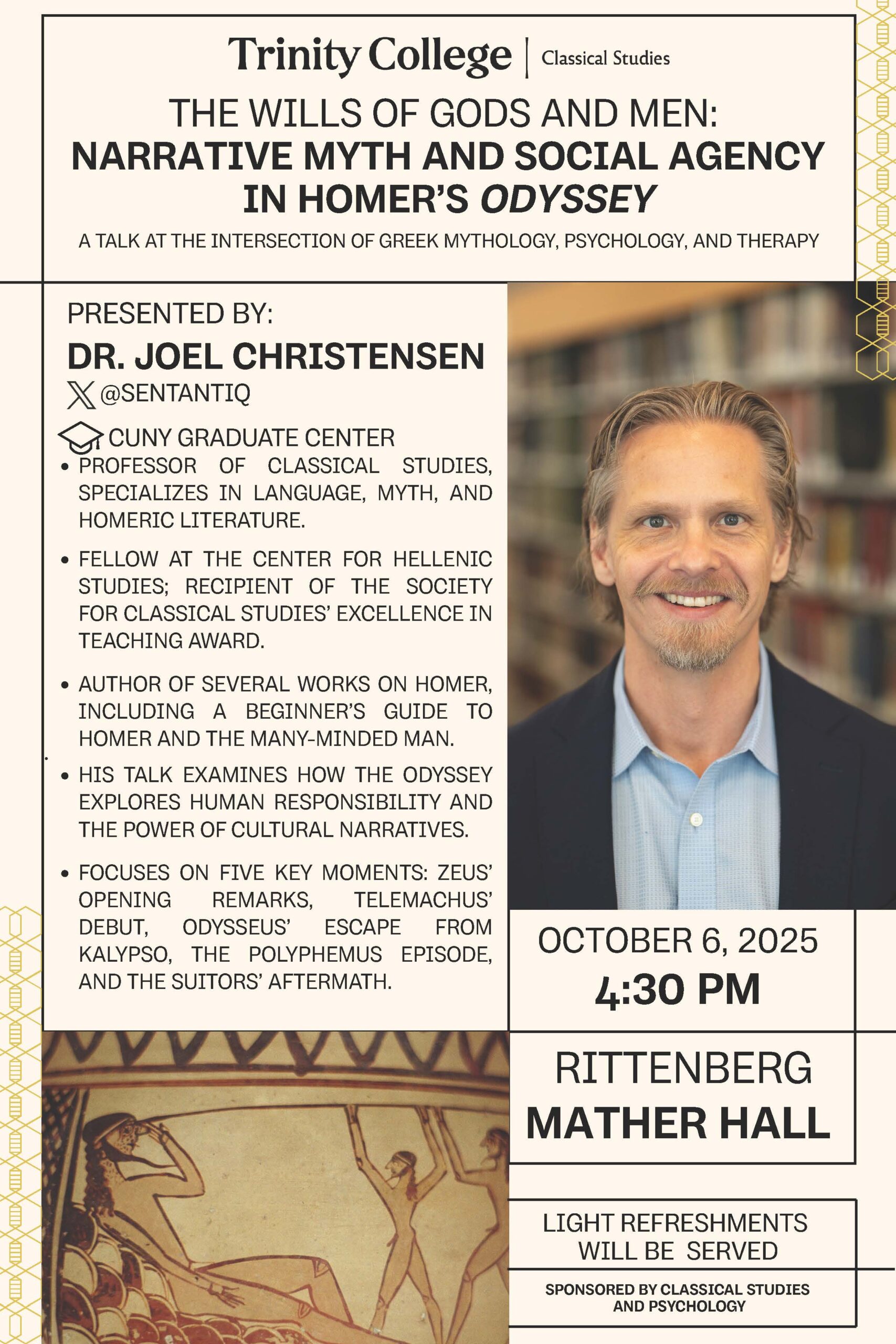 |
Thursday, April 25, 2025, at 5:30pm
Rittenberg Lounge, Mather Hall
Archimedes’ Cosmos(es): Exploring the Frontier of Science and Literature in Antiquity
Hans Wietzke, University of Massachusetts, Amherst
“In his treatise the Sand-Reckoner, the ancient scientist Archimedes presents a system for naming extraordinarily large numbers, larger than the number of grains of sand that would fill the universe. In so doing he describes several cosmic models, including one in which the Earth orbits the sun—almost 2,000 years before Copernicus proposed his revolutionary theory of heliocentrism. But what exactly was Archimedes’ interest in a sun-centered cosmos? In this talk I discuss Archimedes’ ambitions, showing how the Sand-Reckoner was not simply a scientific endeavor, but a literary one grounded in contemporary poetic aesthetics. I thus hope to show how the study of Archimedes challenges us to rethink conventional boundaries between science and the humanities.”
‣Free event! All are welcome!
|
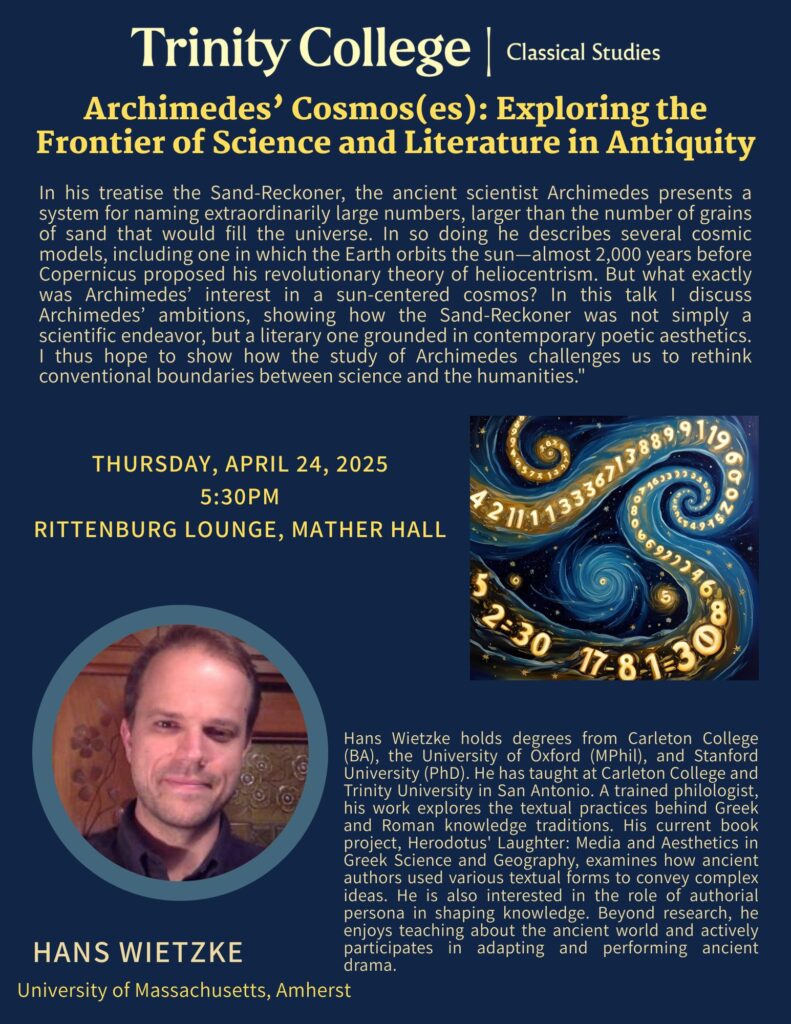 |
Wednesday, November 11, 2024, at 11:00 am – Rittenberg Lounge, Mather Hall
Living in the Lion’s Jaws: Survival as Resistance in Martial’s Lion and Hare Cycle by Dr. Emi Brown
In this talk, Prof. Emi Brown will tell us about her research on the first-century A.D. Roman poet Martial. Martial came from what is today the country of Spain, a margin of the Roman Empire at the time. Dr. Brown will elucidate Martial’s poetic practice, creating art in the context of one of the most dictatorial emperors.
‣Free event! Food! All are welcome!
|
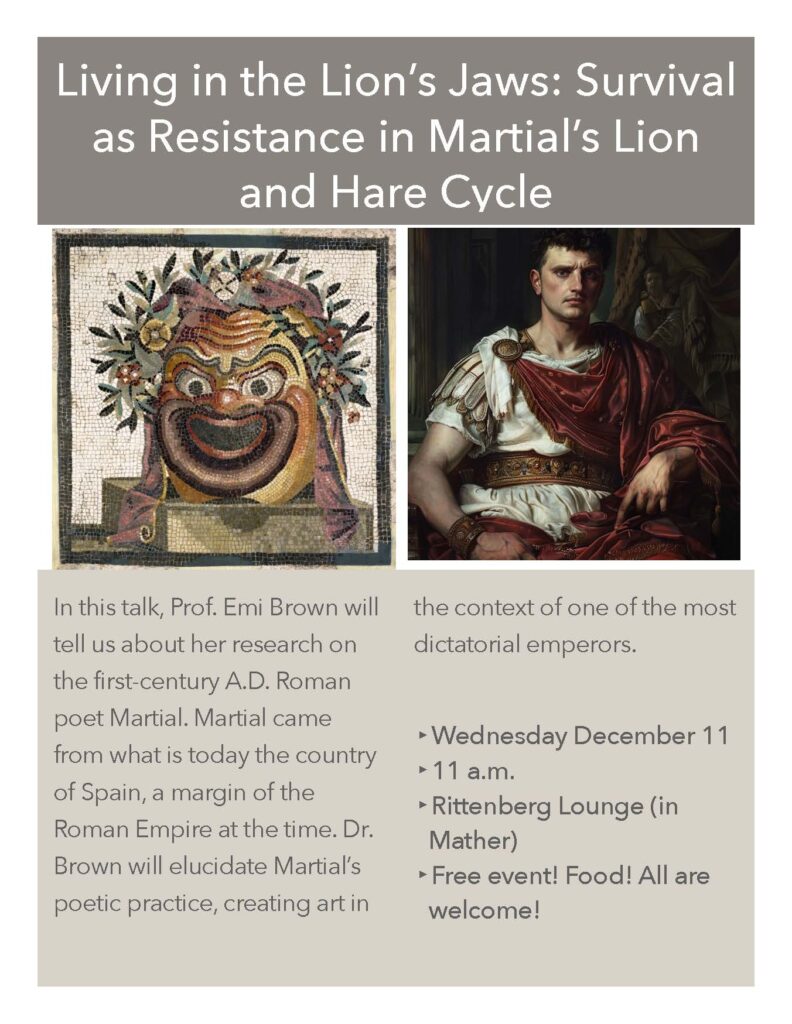 |
| Thursday October 31st at Common Hour in the Joslin Family 1823 Room, Library
The Princeps In Pittsfield: A Third-Century Inscription in the Berkshire Museum by John Higgins
Dr. Higgins is going to present an inscription in Greek from the eastern Roman frontier that’s now in Pittsfield, Massachusetts’ Berkshire Museum. It dates to the time of the ancient Roman emperor Gordian III, who ruled from 238-244 A.D. Dr. Higgins will talk about the inscription itself and what it means for our understanding of the Romano-Persian wars in which Gordian later died. He will also talk about how it came to Pittsfield, and the dealer who sold it to the Berkshire Museum.
|
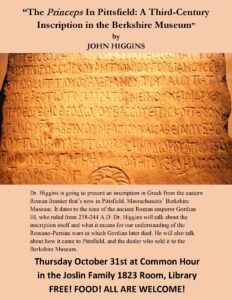 |
| Thursday, September 19, 2024- Common Hour – Reese Room, Smith House
The Blues of Achilles: a musical performance by Joe Goodkin
Joe will perform selections from his music that adapts the ancient Greek epic poem the Iliad, steeped in ancient and modern war literature as well as interviews and his experiences playing music at VA hospitals as part of recreational therapy for veterans experiencing PTSD and other related war traumas.
Joe’s first-person songs capture the horror, grief, and love that permeate the Iliad and the combat experience. Each song takes on the perspective of different characters, from warriors like Achilles and Patroclus, to kings like Priam, and women like Briseis, Helen, and Andromache. |
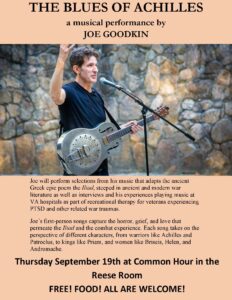 |
Thursday, April 18, 2024; Common Hour; Rittenburg Lounge
Psychedelic Art in the Aegean Bronze Age
Dr. Karen Polinger Foster, Yale UniversityThe hallucinatory visions engendered by the consumption of psychoactive substances, as well as the production of mind-bending imagery have inspired artistic creation far across space and time. Following a brief overview of the science of psychedelia, this talk investigates Aegean Bronze Age art for evidence of the principal psychedelic hallmarks. Two case studies are considered—Kamares Ware vessels of the Old Palace period on Crete, and the wall paintings on the upper floor of Xeste 3 on Thera. As argued here, both exhibit clear signs of psychedelic influence and intent. To help bridge the gap of 3500 years, analogous examples of modern psychedelic art are discussed and illustrated. |
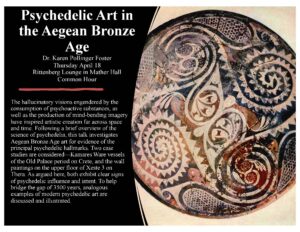 |
| Tuesday March 28, 2023 – Common Hour – Rittenberg Lounge
The Blues of Achilles: a musical performance by Joe Goodkin
Joe will perform selections from his adaptation of the ancient Greek epic poem the Iliad, steeped in ancient and modern war literature as well as interviews and his experiences playing music at VA hospitals as part of recreational therapy for veterans experiencing PTSD and other related war traumas.
Joe’s first-person songs capture the horror, grief, and love that permeate the Iliad and the combat experience. Each song takes on the perspective of different characters, from warriors like Achilles and Patroclus, to kings like Priam, and women like Briseis, Helen, and Andromache. |
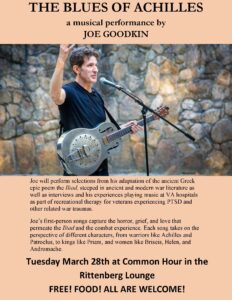 |
|
|